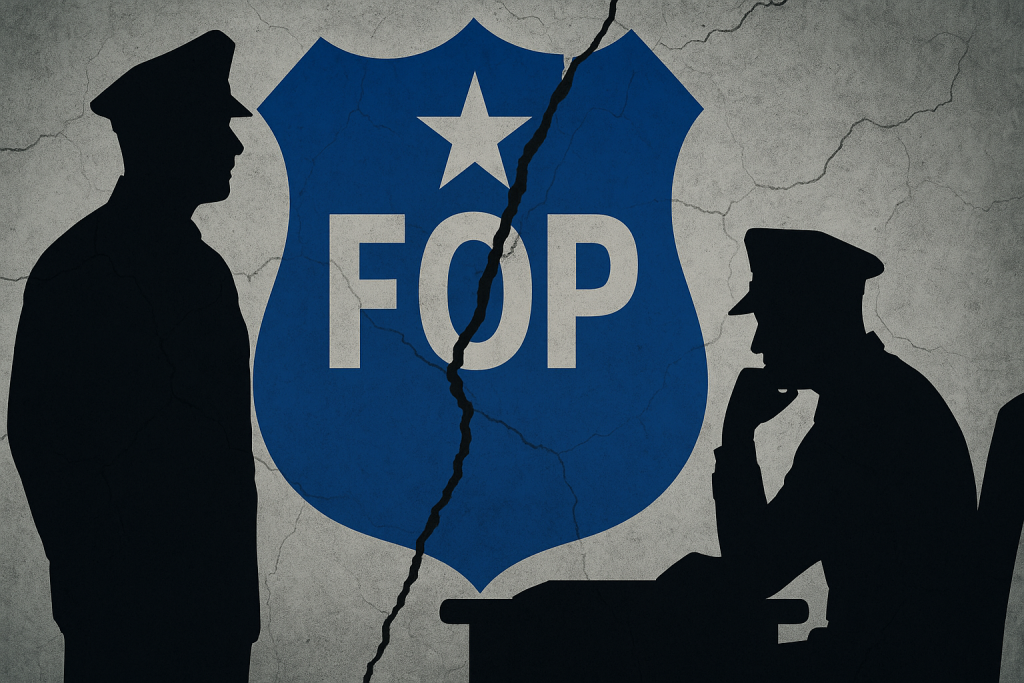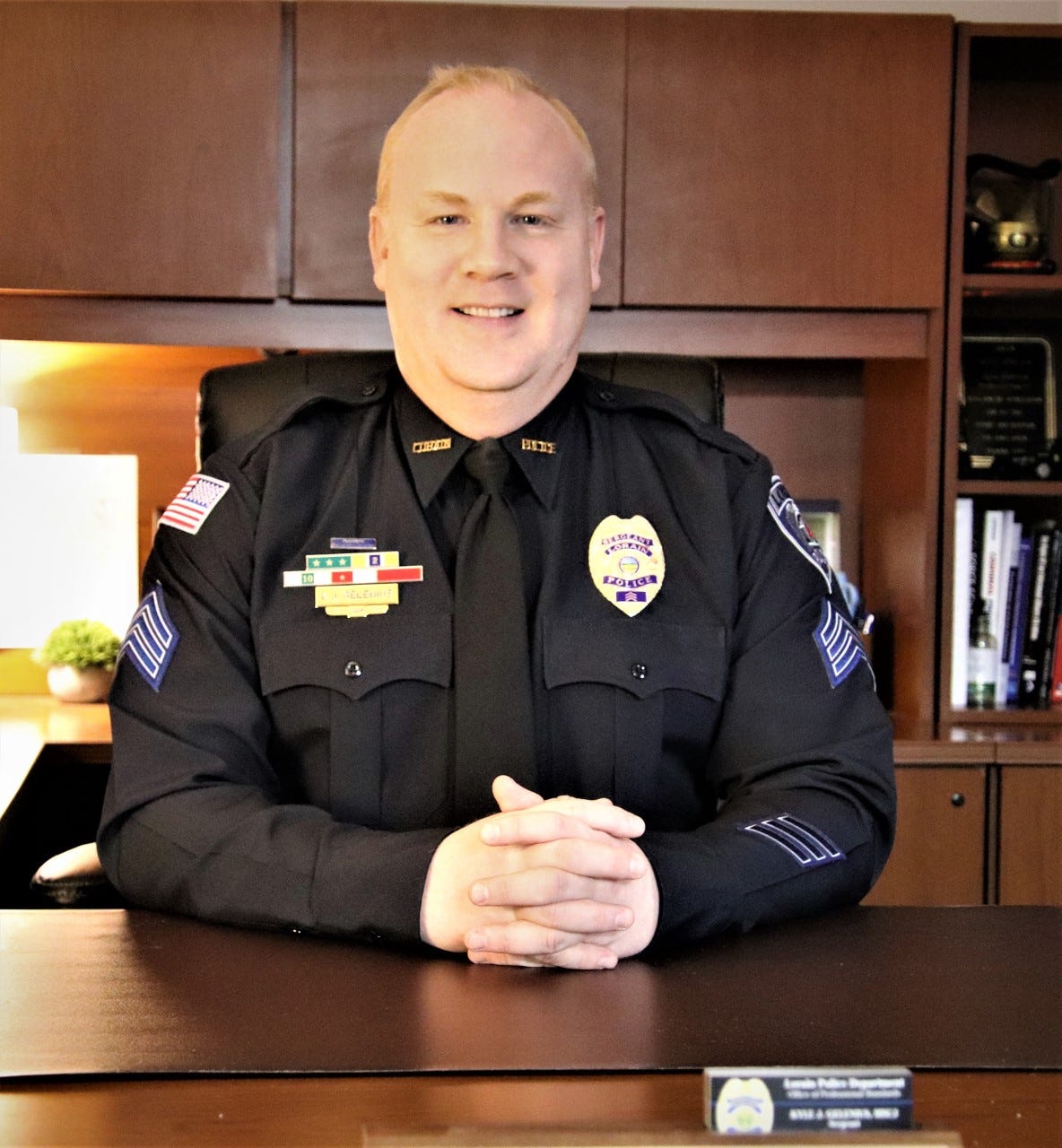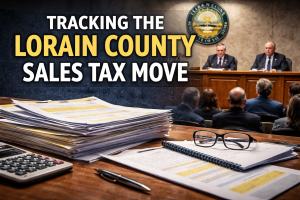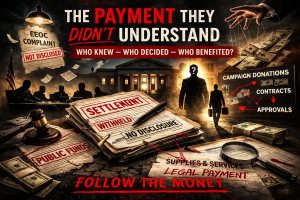Episode 8: FOP – Fraternal or Fractured?

By Aaron C. Knapp Lorain Politics Unplugged – Investigative Series
Apr 21, 2025
The Watkins Complaint and the Crack in the Wall
The unraveling of Lorain’s “fraternal” illusion began not with a public scandal, but with a complaint. Captain Roger Watkins, a veteran officer and then-chair of the Employee Review Board, filed a formal grievance in late 2022 accusing Police Chief James McCann of misconduct, retaliation, and attempted influence over disciplinary decisions. Watkins alleged that McCann repeatedly tried to sway board outcomes and used his authority to target critics within the department.

Thanks for reading Aaron’s Substack! Subscribe for free to receive new posts and support my work.
One key example: McCann allegedly expressed satisfaction when a 14-year veteran, Detective Jeremy Gray, retired after making critical Facebook posts about the Chief. “That’s what he gets for f****** with me,” McCann reportedly said.
These allegations should have sparked a department-wide reckoning. Instead, they were met with silence, skepticism, and apparent indifference. Watkins, who himself was under internal investigation at the time for his handling of a misconduct case involving former Lt. Tabitha Angello, retired shortly after filing the complaint. Chief McCann remained in office. Mayor Jack Bradley confirmed receipt of the documents but questioned Watkins’ timing and motives. The Law Department promised to “review” the complaint. No independent investigation was launched. No disciplinary action followed. And just like that, the wall of accountability held firm—at least publicly.
Watkins’s accusations included not only personnel manipulation but also a systematic culture of retribution. He claimed McCann undermined ERB independence by privately lobbying for outcomes before formal hearings. Watkins also alleged that McCann was fixated on eliminating dissent, using strategic promotions, reassignments, and internal investigations to control the narrative and cripple union resistance.
In one instance, McCann is alleged to have declared that Sgt. Kyle Gelenius “couldn’t be the union president and in Internal Affairs,” adding that his reassignment was what the union got for “f******” with him.
The implications of Watkins’ complaint are profound. If true, they confirm what multiple whistleblowers and internal critics have whispered for years—that Chief McCann doesn’t just lead the department, he engineers it, punishes enemies, and protects loyalists. In that context, Watkins’s departure was not a disruption to the system. It was proof that the system was working exactly as designed.
Adding further insult to injury, no public record shows that Watkins was ever interviewed in depth following his complaint. According to his own statements, he believes his concerns were dismissed outright. The silence of oversight mechanisms—City Council, the Law Department, even the Civil Service Commission—created a vacuum that has since been filled with mistrust, low morale, and escalating public skepticism about the city’s commitment to transparency.
Still, Watkins’s actions were not entirely in vain. His complaint cracked the wall. It forced the city to publicly acknowledge friction inside the LPD. It coincided with an already brewing no-confidence vote within FOP Lodge 3. It catalyzed later reporting by journalists and ignited quiet solidarity among officers tired of a culture where dissent is punished more harshly than misconduct.
Most importantly, the complaint served as a narrative turning point. It exposed a schism in the department—not merely between officers and leadership, but between values. Between those who still believe in ethical service, and those who serve the agenda of unchecked power.

Divide and Control
Beneath the surface of rank-and-file unrest lies a strategic game of division—one played masterfully by Chief McCann, according to both public records and internal sources. His method? Divide and control. Reward the compliant. Undermine the dissenters. Keep the department fractured just enough to prevent collective resistance.
At the heart of this tactic is manipulation of the Fraternal Order of Police (FOP) Lodge 3. Once a vocal and occasionally adversarial force, the FOP’s ability to protect its members has been quietly diluted through leadership shifts and internal infighting.
While Kyle Gelenius was FOP President, the union voted “no confidence” in Chief McCann.
Yet shortly after, Gelenius was reassigned to lead OPS—
a move viewed by many as a power grab designed to neutralize his union authority.
By 2024, Isaiah Taylor had assumed the presidency. What happened in between was a methodical consolidation of influence.

Promotions became a political currency. Internal affairs appointments were made with strategic consequences. And while McCann insists he doesn’t “promote or demote,” his fingerprints are all over key personnel changes. From the sidelining of outspoken officers to the abrupt elevation of loyalists, the throughline is unmistakable: McCann ensures loyalty not through inspiration, but intimidation.
The Watkins complaint captured this culture succinctly. “If you weren’t in the circle,” Watkins wrote, “you were in the crosshairs.”
Officers were not only denied advancement but actively punished for perceived slights—comments on social media, quiet complaints, or even vague associations with known critics. The result? A department full of whispered warnings: “Keep your head down. Don’t say too much. Don’t be next.”
This environment wasn’t just toxic for officers—it had tangible consequences for the public. With morale collapsing and recruitment faltering, the department struggled to meet basic staffing needs.
Chief McCann himself testified before the state legislature in 2024 about the department’s recruitment woes, blaming negative media coverage and a lack of community support. But what he omitted was the internal climate—one where officers feared leadership more than criminals.
Even off-duty jobs—vital income streams for many officers—became bargaining chips. When the FOP filed grievances against the administration, McCann abruptly suspended all off-duty work assignments. Officers took it as a message: challenge me, and I’ll hit you where it hurts. It was a union-busting maneuver executed without needing a vote.
Yet, even within the fractured FOP, resistance lingered. Jamie Ball, once a critic of McCann, tried to steer the union back toward advocacy. But as leadership changed hands, the union’s voice softened. Officers privately wondered if the FOP was still theirs—or just another arm of the Chief’s political machinery.
“People think the union protects us,” one officer confided off the record. “But these days, it feels like it protects whoever’s in charge.”
And that, perhaps, is the most dangerous outcome of all. Not just a silenced department, but a union whose silence was bought, brokered, and buried—one power play at a time.
The Chief’s Inner Circle: Loyalty Over Merit
The strength of any law enforcement agency should stem from its professionalism, fairness, and merit-based advancement. Yet within the Lorain Police Department, promotions and assignments often appear tethered to personal loyalty rather than institutional excellence. Multiple sources, including the Watkins complaint and internal communications reviewed by this author, suggest that Chief James McCann has developed a “circle of trust”—an elite cadre within the department who receive favorable treatment, strategic assignments, and protection from disciplinary scrutiny.
Officers who challenge McCann’s authority, raise questions, or advocate for reforms are systematically frozen out.
In one instance, a sergeant who questioned the fairness of a shift bid process found themselves reassigned without explanation. In another, an officer with a stellar disciplinary record was passed over for promotion in favor of a junior officer closely aligned with McCann. These incidents may not be illegal on their own—but taken together, they paint a portrait of a department functioning more like a private club than a public institution.
The Watkins complaint lays this bare. Watkins, as a captain and chair of the Employee Review Board (ERB), recounted several instances where McCann attempted to sway disciplinary hearings in favor of officers he favored or against those he disliked.
These were not suggestions or informal advice—they were framed as expectations. The most troubling part? Several officers confirmed that these efforts were effective, especially when ERB members feared blowback for resisting McCann’s will.
This power dynamic extended beyond the walls of the department and into the city’s political infrastructure. McCann’s documented donations to municipal judges, including a $500 check to Judge DiMascio, cast a shadow over the supposed impartiality of Lorain’s justice system. Public records show that those donations were made during politically sensitive periods when the Chief was facing internal dissent and public scrutiny. It should be noted he has also donated $500.00 to Tony Dimacchia in his last campaign, Tony is the Head of the City of Lorains Law Enforcement budget committee.
Sources familiar with the internal culture report that some officers privately refer to McCann’s leadership style as “the doctrine”—a way of doing business where personal loyalty trumps process, and silence is rewarded more than courage. Promotions are not earned, they’re inherited—granted to those who remain quiet, don’t rock the boat, and play along with whatever narrative is convenient to the administration.
What emerges from this pattern is not just dysfunction, but a carefully constructed system of power consolidation. The Chief’s inner circle ensures compliance, not by commanding respect, but by fostering fear. And that fear trickles down through the ranks—creating a climate where challenging misconduct is seen as a career-ending act of defiance. In such a system, justice is not blind. It’s watching closely, deciding who gets a future and who gets forced out.
OPS: The Illusion of Oversight
The Office of Professional Standards (OPS) was designed as the department’s internal compass—a division meant to ensure accountability, impartiality, and ethical enforcement of rules. Under Sgt. Kyle Gelenius, however, it has become a lightning rod for allegations of bias, conflict of interest, and administrative weaponization.
Gelenius, who once accused Chief McCann of making homophobic slurs—including referring to him as “Gay-lenius” and mocking his attire with comments like “fairy socks”—was reassigned to head OPS shortly after those complaints surfaced. The Clemans-Nelson investigation substantiated at least one of those remarks, stating it was “more likely than not” that McCann engaged in inappropriate workplace conduct. And yet, rather than being protected or empowered, Gelenius was neutered. Plucked from his role as FOP President, he was repositioned into a politically sensitive role where neutrality was expected but virtually impossible.
This transfer was not seen as a promotion by many in the department—it was seen as a silencing tactic. “You can’t be union and IA,” one former officer said. “That’s not oversight. That’s co-optation.” The sentiment was widely echoed, particularly as complaints filed during this time were perceived as being dismissed or over-scrutinized. OPS investigations, including the high-profile report on Lt. Corey Middlebrooks, were criticized for reading more like indictments than impartial inquiries.
According to insiders, the Middlebrooks report was filled with editorialized language, unnecessary digressions, and what one officer called “a tone of contempt.” Instead of simply reviewing the facts of the discrimination complaint, the report seemed designed to discredit Middlebrooks himself—casting doubt on his motives, recollections, and professionalism. It resembled a prosecution more than an investigation.
Public confidence in OPS waned. Community advocates began calling for an independent civilian review board. Civil rights attorneys noted the glaring lack of transparency and questioned how an agency could fairly investigate itself—especially when the investigator had once been a target of retaliation. And yet, the city stood behind OPS and McCann, refusing to revisit any findings or commit to external oversight.
Even worse, evidence emerged that Gelenius himself was discouraged from pushing too hard. According to a former ERB member, “It was made clear that the real purpose of OPS wasn’t to find misconduct—it was to make it go away.” In this light, OPS doesn’t stand for Professional Standards. It stands for Obfuscation, Protection, and Silence.
The damage to the institution is profound. Officers no longer trust the internal process. Whistleblowers are silenced or reassigned. Community members see the badge not as a symbol of protection, but of secrecy. And OPS, once the department’s last line of ethical defense, has become just another brick in the wall.
Author’s Reflection: When Walls Speak Back
I’ve read the Watkins complaint. I’ve read Middlebrooks’s testimony. I’ve spoken with officers whose careers were derailed not by misconduct, but by daring to question it. What I see—what we’ve laid bare in this series—is not just the story of one police department, but a systemic rot that begins at the top and eats its way through every layer of accountability.
Chief McCann’s defenders say he’s misunderstood. That he’s a product of tough policing and an older generation. But what kind of leadership weaponizes promotions, mocks the marginalized, and silences whistleblowers? What kind of leadership responds to allegations of racism and homophobia with shrugs, smirks, or training classes that clearly didn’t work? This isn’t just about failing to evolve—it’s about choosing not to.
The OPS unit under Gelenius became a tool for suppression. The union was fractured until it could no longer roar. And the city—the very government tasked with oversight—looked the other way when the walls began to crack. Why? Because holding McCann accountable would mean admitting what they’ve allowed to fester.
I moved to Lorain from the West Coast. I didn’t expect utopia, but I did expect decency. I did not expect to find KKK jokes in captain’s offices. I did not expect to see union presidents silenced with strategic reassignments. And I certainly did not expect to see a city where the only people punished are the ones who speak up.
The Lorain Police Department has become a cautionary tale—of what happens when loyalty replaces leadership, when fear trumps fairness, and when silence is mistaken for peace. And if we don’t confront that truth, we don’t just fail the officers still inside. We fail every resident who deserves a department that serves them—not itself.
This series is not just an exposé. It’s a call to action. If we want to reclaim the word “fraternal,” we need to dismantle the walls that hide what’s happening behind the badge. The walls are speaking. Are we ready to listen?
Next Episode: When the FOP Voted No Confidence – and What Happened After
In Episode 9, we’ll explore the historic 2021 “No Confidence” vote issued by FOP Lodge 3 against Chief McCann. Who led it? Who resisted? And what changed—if anything? Join us as we uncover the union inflection point that should have rocked the city. But didn’t.




